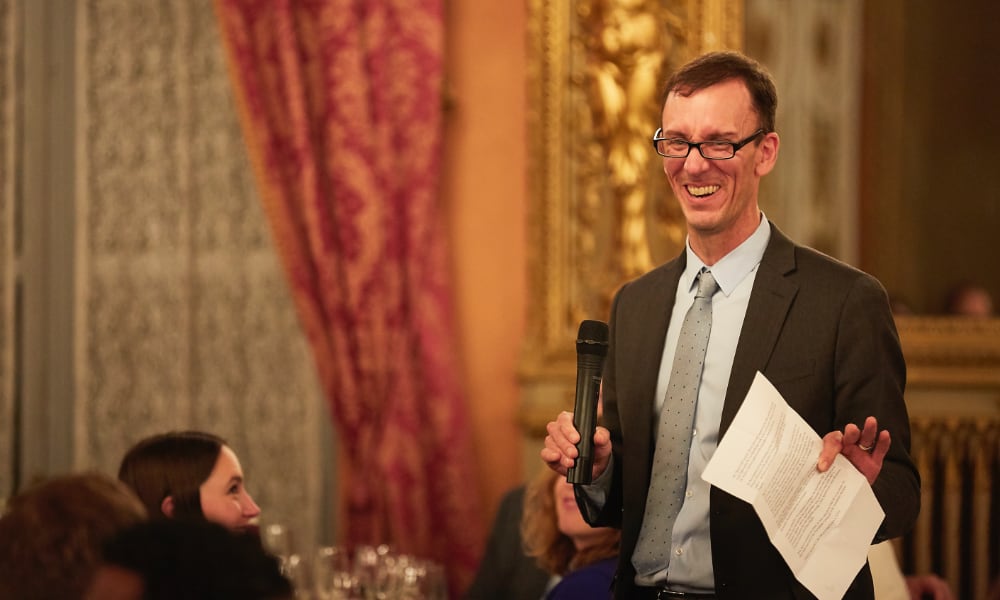Message from the Executive Director
Fall 2019
M.A. in Political Science, European Union Policy Studies
Dear EUPS Alumni and Friends,
Students in the current EUPS cohort have recently returned from their first academic excursion to Brussels. In travelling from central Italy to Brussels and back, our students were retracing a path that Altiero Spinelli—a relatively unsung parent of the EU—had made many times.
We name the fall Brussels excursion after Spinelli (1907-1986) for a number of reasons. Spinelli helped to inspire the postwar integration project and, eventually, to take on leadership roles in multiple EU institutions. Italy’s fascist regime had imprisoned Spinelli and other political critics on the island of Ventotene during World War II. In 1941, Spinelli hastily scribbled a manifesto on the back of cigarette papers. His allies smuggled Spinelli’s Ventotene Manifesto out of the prison and shared it with wide audiences across the continent. In the document, Spinelli sketched an ambitious federal design that recalled, in numerous particulars, James Madison’s federal vision for the United States.
Spinelli’s vision was more radical than the vision of integration that other postwar actors endorsed. But citizens from across Europe’s postwar political spectrum generally shared the spirit of cooperation and reconciliation that animated Spinelli’s cigarette-paper manifesto. As the integration process developed, Spinelli—long since a free man—took up critical leadership positions. He served as a European Commissioner in the early 1970s, and, in 1979, he won a European Parliament seat during the EP’s first direct elections.
Our students’ Italy-to-Brussels path is considerably easier than Spinelli’s. It’s much easier to get a FLR-BRU flight than it is to escape an island prison and find one’s way to the European Parliament. When they go to Brussels in the fall, though, our students take a bit of Spinelli with them, and they bring a bit more of Spinelli home with them once they return. Like Spinelli, they approach Brussels with a deep understanding of the similarities and differences between political integration all’europea and political integration yankee-style. And when they arrive in Brussels, they forge professional relationships with the same diverse range of actors—representatives in the Commission, the Parliament, the Council, and beyond—with whom Spinelli worked as a Commissioner and MEP. Like the author of the Ventotene Manifesto, they seek to inject a bit of Madison into the European project.
This fall’s students visited Brussels at an important transitional moment. European Parliament elections took place back in May, and, for the first time ever, voter turnout went up. At is first post-election meetings, MEPs chose another politician from central Italy—Florence’s own David Sassoli—to serve as president of the parliament. In recent months, we have also learned who will hold the top seats in other EU institutions. Two EU institutions that have traditionally been characterized by major gender imbalances—the European Commission and the European Central Bank—will both be led, for the first time, by women. Germany’s Ursula von der Leyen will command the Berlaymont, and France’s Christine Lagarde will oversee euro governance from Frankfurt. Spain’s Josep Borrell, the former EP president who has visited Palazzo Capponi and worked with EUPS students, will replace Federica Mogherini as the EU’s high representative for foreign affairs and security policy. And Charles Michel will transition out of his role as Belgian prime minister and into the role of European Council president.
Our students have been thinking hard about the impact of these transitions: how will they affect the transatlantic relationship? How will the shifting cast of EU heads of state and government interact with the leaders of the Commission, Council, EP, European Council, and ECB? Will von der Leyen and company catalyze a post-Brexit European renaissance (provided that the UK does finally depart from the Union)? Will they shore up the pro-European center against the variety of Euroskeptic populisms? Which approaches will they take toward the Western Balkans? Toward Russia, China, Iran, Turkey, and Africa?
As I announced at the annual welcome back/sendoff event in Washington, DC this past August, fall 2019 is also a time of transition for the EUPS program. At the end of this year, I’ll hand the executive director’s baton to Dr. Chris Blake. Sara Rzegocki (B.A. 2019, M.A.x2020) recently asked me some questions about my time in the position; for the full write-up, see the piece elsewhere in this issue of the newsletter. For now, though, I want to convey how truly excited I am that Dr. Blake is taking on this role. He has taught in the program for years. He has been one of the program’s biggest advocates, and he has already developed productive working relationships with our on-site faculty and staff. For my part, I look forward to supporting the program from Miller Hall—to ramp up my teaching about European and transatlantic issues, to deepening my research and scholarly engagement on EU-related affairs, and to working with the program in a variety of ways. Of course, I look forward to keeping up with our ever-expanding, increasingly engaged, and inspiring set of program alums and friends.
Readers will find plenty of things to reflect upon in this issue of the newsletter. Dr. Anna Lavizzari, who is currently teaching the program’s course on EU institutions, shares her insights on a critical issue—gender equality—that affects the legitimacy and functioning of the EU system. Liz Hammer (B.A. 2013, M.A. 2014), who recently discussed career-development issues with members of the current cohort, traces connections between her EUPS experiences and her post-graduation trajectory. In addition to arranging my exit interview, Sara Rzegocki compares and contrasts the two urban lodestars—Brussels, Washington, DC—of the transatlantic relationship.
Happy reading, and, as always, Forza JMU!

John Scherpereel
Executive Director, JMU programs in Florence
